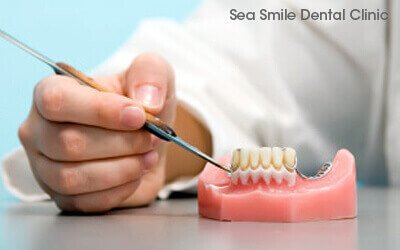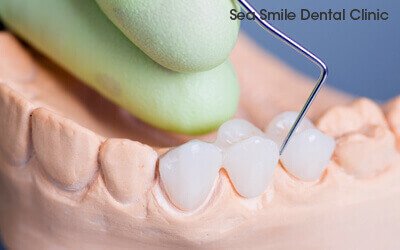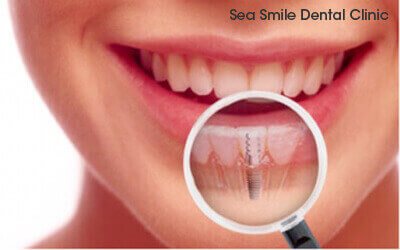About Missing Tooth/Teeth
Our teeth are very essential to our livelihood and if we lose just even one or a number of them, our everyday lifestyle will significantly change. Moreover, they are vital to our overall health and well-being. Unfortunately, even if we do our best to maintain them healthy and clean, tooth loss can transpire for certain reasons like trauma or injury, oral diseases, mechanical failure, or simply by congenital absence. Embarrassment or self-consciousness would just be an initial consequence. While depriving you of bringing out that smile that’s really you, a missing tooth needs to be replaced for more serious consequences like:
- BONE LOSS/RESORPTION — Losing one or more teeth can lead to additional dental health risks, such as deterioration or loss of your jawbone. The jawbone deteriorates and losses its strength and stability when it remains inactive or when it is not being used to support a natural tooth. Unfortunately, bone resorption occurs almost immediately after the tooth is removed and progresses over time when ignored.
- TEETH DRIFTING/SHIFTING — Once a tooth is removed, there is a constant tendency for the neighbouring or adjacent teeth to lean over the vacant space. In the same manner, a “super-erupt” may also occur wherein the shifting of the opposing teeth eventually drifts down into the vacant space. This would then create gaps around the contours your gum tissue, which would eventually trap and accumulate food or dirt, making your gums prone to periodontal disease and/or dental decay.
- BITE AND CHEWING DIFFICULTY — Apart from the drifting/shifting of the neighboring teeth after a tooth is removed, a movement among the teeth consisting of tipping and/or rotating will have an unfavourable effect on your bite, a condition commonly known as “malocclusion” wherein tooth loss prevents your ability to chew food naturally; often resulting to indigestion or malnutrition.
- SPEECH IMPAIRMENT — Tooth loss can also hinder your ability to speak properly. The ability to speak includes a complex interaction inside the mouth which involves your tongue, lips, and cheeks. The loss of one or more teeth significantly affects this complex interaction, thereby making it more difficult for you to speak properly. This difficulty will eventually increase as more teeth are lost making you less adaptive to a normal speech pattern. Moreover, it is embarrassing for most people to open their mouth to speak when they have missing front tooth/teeth.
Treatment Options for Missing Tooth/Teeth
Replacing your missing tooth or set of teeth is a serious matter. At Sea Smile Dental Clinic, our goal is to prevent you from encountering such consequences by providing various options to replace your missing tooth/teeth:
1. Removable Dentures

Dentures are removable dental fixtures for replacing missing tooth/teeth and the surrounding tissues to restore your smile and dental health. They come in two types – Partial and Complete Dentures, and they are made out of a combination of acrylic plastic for the gum-like base where the artificial teeth are attached and supported by cobalt-chromium metallic framework. Dentures are removable so they can be taken in and out of your mouth for cleaning purposes such as brushing or flossing, as well as permitting you from wearing them while sleeping.
Dentures, either partial or complete, conventionally or immediately placed, can be beneficial to both your appearance and oral health. When you lose most or all of your teeth, you facial muscles will tend to sag and make you look older. Dentures can prevent such effects as they can bring back the normal features and natural facial profile. And most importantly, they can make it easier for you to eat or chew food properly and speak better than you could without teeth, in which case is often taken for granted by most people.
2. Dental Bridge

Another option for replacing missing tooth/teeth and restoring your smile is the use of a Dental Bridge. This option can be considered a more permanent approach in replacing one or more of your missing tooth. Unlike Dentures, which are removable for cleaning on a daily basis, Dental Bridges are fixed-prosthetic -devices which are cemented in place over existing natural teeth and can only be removed by your dentist when the need arises, like for replacement or repairs.
Dental Bridges can either be made of metal, porcelain, a combination of both (porcelain fused to metal), or ceramics. Porcelain is the common choice for aesthetic considerations as your dentist can actually match the colour of the entire bridgework with your existing natural teeth.
3. Dental Implants

Dental Implants are currently the most advanced technique in replacing missing tooth/teeth. They have been used and continuously being developed for over 30 years and yet the technology remains to be the ideal tooth replacement solution. Dental Implants are used to replace a missing tooth, a number of missing teeth, and as support to a dental fixture. Implant-supported teeth fixtures not only feel, look, and function like natural teeth, but they also preserve the integrity of facial structure, and improve the look and function of the jaw.

